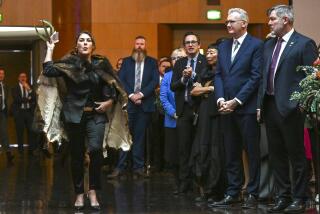Globalization Poses an Olympic-Size Conundrum for Australia
- Share via
SYDNEY — The week before the glorious Olympic opening ceremonies, marked by an Aborigine sprinter carrying the torch to the finish line, a major international conference in Australia on globalization practically unraveled because of protest demonstrations. The unexpected messiness claimed to shock many Australians--angry political protests are such an “un-Australian” thing. Or so it was said, despite the fact that the month before, the country’s prime minister unceremoniously cut off contact with the U.N. panel probing the status of the Aborigines. That didn’t seem like a friendly, Australian thing to do on the eve of the Olympics, either. The Australian Aborigine controversy and the Olympics symbolize two chief results of an ever-shrinking globe. For what globalization can give thriving governments and societies--a nice uptick on the national bottom line--it can take away in national autonomy and insulation from the world.
Like America’s Indians, the Aborigines of Australia didn’t fare too well when the migrating Europeans came ashore and haven’t fared especially well since. While many governments and corporations lustily support the current trend toward one world because it seems to be a wealth creator, they tend to resist the intrusion of globalized ethical standards as an attack on national sovereignty. Yet you can’t have your globalization and eat it, too: With all the incoming dough from the rest of the world comes increased moral scrutiny from the rest of the world.
On the wealth-benefit front of globalization, Australia could hardly ask for more. Over the last decade, its growth rate has been second in the world, its current expansion has lasted 37 consecutive quarters, its annual average growth has run at 4.1% (the U.S. comparison is 38 quarters, 3.7%), and unemployment and inflation have laid low. In a major address at the World Economic Forum conference in Melbourne the week before, Ian MacFarlane, governor of the Reserve Bank of Australia (the country’s Alan Greenspan), attributed the economic success to increased national productivity. This has been triggered by the globalization of national markets. Pointing to his fellow citizens’ avidity for new technology, at least as measured by its increasing Internet usage and e-commerce servers per capita (a silver medal only to the U.S. gold), MacFarlane concluded, with understatement: “The influence of the world economy has been quite expansionary for Australia.”
But as Australia lines its pockets from globalization, not to mention the Olympics, it must not close its heart to cries for justice or turn a deaf ear to the argument of legitimate world organizations like the United Nations that globalization mandates not only new possibilities for profits but for people as well. True, neither the U.N. nor any other world body should seek to impose a one-size-fits-all standard on domestic-rights issues, just as it was unwise for the International Monetary Fund to impose cookie-cutter economic recovery blueprints on troubled Asian economies, no matter what their differences. But by persistently refusing to issue a simple official apology for the nation’s historic mistreatment of Aborigines, Canberra leaves the impression that Australia prefers a provincial sense of justice, not a cosmopolitan one.
In part, this reluctance to recognize what others in the region and beyond regard as proper conduct reflects the decades-long ambivalence of Australia, with its strong Anglo-Saxon heritage, about whether it should fully engage nonwhite Asia. This ambivalence has marked its history particularly since the end of the Vietnam War. Since Malcolm Fraser’s regime more than two decades ago, governments have vacillated on this point, and Asians have taken note. In the sweeping second volume of his memoirs, just published in Asia, Singapore Senior Minister Lee Kuan Yew recounts tellingly how he and other Asian leaders continually tried to persuade Australia’s political elite to “open up and become part of the region.” For many years, it was a hard sell.
Even so, trade has undoubtedly brought a new intimacy with Asia, as has regional political trauma. Consider that Prime Minister John Howard, though clumsily backtracking on the Aborigine issue, boldly stepped up to the challenge of East Timor last year by ordering in thousands of Aussies to tamp down the blood bath and restore a semblance of order. That took guts--and Asia-Pacific commitment. As Singapore’s Lee concludes, “When the defining moment came, Howard acted as a prime minister of Australia should.”
And Lee added this: “These events confirm the obvious, that Australia’s destiny is linked more to Asia than to Britain or Europe.” Once Australia’s political establishment officially apologizes for the massacres and systematic mistreatment of Aborigines dating back to the 18th century--as someday it will--and as long as it continues to work in good faith to improve their living conditions, it will escape the worst of the nation’s past by fully accepting the dual dimensions of globalization’s future. And, in so doing, this vibrant democracy will have set an Olympian-size example for us all.
More to Read
Go beyond the scoreboard
Get the latest on L.A.'s teams in the daily Sports Report newsletter.
You may occasionally receive promotional content from the Los Angeles Times.






